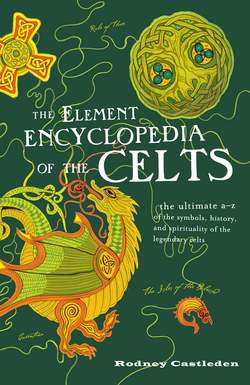Читать книгу The Element Encyclopedia of the Celts - Rodney Castleden - Страница 158
GILDAS
ОглавлениеGildas the Wise was a Celtic monk who lived and wrote in the sixth century. He was born in Alcluith, the son of Cauus, and possibly the brother of Cuillus, who rebelled against Arthur. He migrated, probably in infancy, to Wales. He attended Illtud’s famous school, along with with Samson and Paul Aurelian.
Gildas preached in north Pembrokeshire in the time of King Tribinus and his sons. He preached in northern Britain, received a message from Brigit, and sent her a bell. He arranged a marriage between Trifina, the daughter of Weroc of Vannes, and the evil tyrant Conomorus (who died in 560). Conomorus cut off Trifina’s head, which Gildas promptly restored.
Gildas wrote strongly condemning the harsh discipline of St. David, and equally strongly supported the milder rule of Illtud and Cadoc of Lancarfan. He returned from a visit to Ireland, visited Cadoc, and supervised the school for a year, writing a Gospel that would later be bound in gold and silver. He spent a winter on Echni (Flat Holm, an island in the Bristol Channel), where he was disturbed by pirates from the Orkneys. After that, in the days when King Melwas ruled Somerset, he went to Glastonbury, where he died in 570.
Gildas is of special interest in being the only historian or commentator who was actually writing at the time of Arthur. His theme was the condition of Britain, which he thought was in a poor state politically and morally, though it was a beautiful land. His book opens with a surprisingly lyrical description of Britain’s watery beauty:
This land of such dear souls, this dear, dear land … decked with lucid fountains, abundant brooks wandering over snow white sands, transparent rivers that glide with gentle murmur, lakes which pour forth cool torrents of refreshing water.
Written in Latin in about 540, the book has the title Book of Complaint on the Ruin and Conquest of Britain. Gildas describes a great British leader called Ambrosius Aurelianus initiating an increasingly successful campaign against the Saxons in the run-up to the Battle of Badon, which he identifies as a landmark in history. By 540, the battle, which had been fought 20 or so years earlier, was seen as a watershed engagement: one that marked the end of one phase of history and the start of another, much as Trafalgar or Waterloo would have been perceived by a mid-nineteenth century historian. It is strange that Gildas does not mention Arthur in connection with Badon, as great a puzzle as Aristotle’s total silence regarding his pupil Alexander the Great.
What Gildas was complaining about above all was the complacency of the British. Those who had struggled to push back the Saxons in the years leading up to Badon had died. The new generation was “ignorant of the storm”—it had no idea what efforts were needed to defend Celtic Britain against the invaders.
It is an articulate and emotionally highly charged account, with a great deal of invective directed at one British ruler after another: Gildas was dissatisfied with nearly all of them. Probably with conscious understatement, he calls his thunderous accusations admonitiuncula, “just a little word of warning.”
The text is largely compiled from biblical quotations, making it more sermon than history. Another frustration is the obscure Latin style Gildas uses, making it rich in ambiguity when what we want is clarity.
There may also have been more than one version. Bede’s specific references to Gildas imply that he, in 731, was working from a different version than the one we have today, and we have no way of knowing which is the more authentic. Gildas died in 570.
